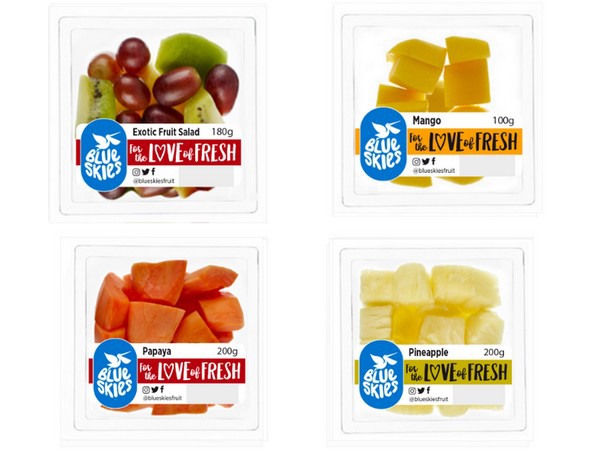“We are fortunate that the majority of our business across Europe is with grocery retailers and not with food service – which has been especially hard hit. Just before the lock down we did gain a major new food service customer but that has been put on hold for the moment,” said Simon Derrick from Blue Skies who supply fresh cut fruit, fresh juice and dairy free ice cream to the retail trade.
“People are still buying fresh cut fruit, but the demand for “Food to Go” products, such as smaller fruit packs and sandwiches, has fallen with the reduction in people buying their lunch ‘on the go’! Across Europe we saw overall sales go up just before the lock downs came into place but they then declined steeply to the point where overall we were down by over 30%.”
According to Simon people are still buying pre-prepared fruit, because it’s healthy and convenient and also possibly because of the perceived standards. “We are seeing sales picking up again – with overall volumes rising by 15% in the last ten days. It is interesting that we are still seeing stronger sales growth in Europe (with the exception of France) than in the UK - in Belgium and Holland we have seen a quicker recovery to almost normal trading. These differences could be down to individual country’s lock down measures or consumers simply settling into a new way of shopping after a few weeks of this new normal.”

Due to the short shelf-life of fresh cut fruit a good logistical chain is essential to get the product to market quickly, and Blue Skies relies primarily on airfreight.
“We would normally load our fruit into the cargo holds of passenger planes, but of course there are not many passenger flights in the air just now. Our products only have a 7-day shelf life, so sea freight is not an option for us. We have therefore had to completely rethink our logistics from one which was reliant on passenger aircraft to one which can now use freighters. We are fortunate to have an amazing team who have worked miracles for us in order to secure the freight capacity we need”
Sourcing from overseas:
Blue Skies source from a network of factories across Africa and South America, including Ghana, Egypt, South Africa and Brazil. With border restrictions and aircraft movements affecting countries in different ways, it has put increased pressure on the company’s logistics. “Fortunately, with the flexibility our model gives us, we have been able to work around the restrictions by moving production where necessary and adapting to use available airfreight capacity. It’s been tough going, but we’ve made it work.”
The company also recently opened a new state of the art factory in Benin, West Africa. “We are very excited about this new facility” says Simon. “Not only will it expand our capacity and sourcing flexibility, but it will also be a flagship in terms of green credentials for Blue Skies as it incorporates new technology and processes that allow us to significantly reduce water, plastic and chemical usage.”
Blue Skies is also fortunate to have the safety net of factory in the UK, which was opened 10 years ago after the Icelandic volcano disruption. “That was a big lesson for our business, because at that time we were entirely reliant on our overseas factories and then the skies over Europe shut down for a week - and a week without being able to supply retailers is a long time. Now, although the skies have shut down in terms of passenger flights, we still have cargo capacity and the facility in the UK. You could argue that the overall situation is much worse this time, but we are still managing to supply our retailers across Europe either by using freighters or by using imported whole fruit and preparing it in the UK.”
The UK factory was set up as a contingency for a situation such as this - but also plays an important role in normal times assembling fruit mixes from different sources and developing new product ideas with our customers for producing in our factories across the world.
Queens Award for Enterprise
On a very positive note Blue Skies was awarded its fourth Queens Award for Enterprise in the Sustainable Development category.
The award recognises the development of the company’s pioneering sustainability plan, called the Blue Skies ‘Blueprint’. This is a set of commitments for People, Planet and Profit, designed to ensure the business can meet the needs of the present, without compromising the ability of future generations to meet their own needs. The Blueprint is created through the company’s ‘Measure Engage Action’ methodology, which enables the business to operate a cycle of continuous improvement based on being able to understand our impact, define our priorities and quickly implement actions to improve.
Chairman and Founder, Anthony Pile said “The principles of sustainable development are firmly embedded within our business, however we know there are growing issues of interest among our stakeholders, such as plastics, waste, and carbon emissions. Our Blueprint enables us to escalate focus on the most important areas and accelerate ideas and projects that will enable us to lead the way.”
For more information:
Simon Derrick
Blue Skies
simon.derrick@blueskies.com
www.blueskies.com
